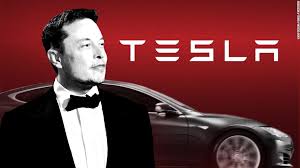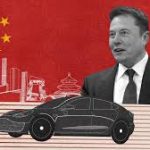Elon Musk’s Tesla Achieves $1.36 Trillion Market Cap

Elon Musk’s Tesla Achieves $1.36 Trillion Market Cap
Introduction: In a monumental achievement, Tesla has officially reached a market cap of $1.36 trillion, solidifying its position as one of the most valuable companies in the world. This milestone is not just a testament to the company’s success in the electric vehicle (EV) market, but also a reflection of its broader impact on the automotive, energy, and technology industries. Under the leadership of Elon Musk, Tesla has revolutionized the way we think about transportation, sustainability, and innovation. The company’s rapid growth and remarkable market valuation signal a new era in the EV space, with Tesla continuing to push the boundaries of what’s possible in both technology and business. In this article, we explore the significance of Tesla’s $1.36 trillion market cap, the factors driving its success, and the implications of this achievement for the future of the automotive and clean energy industries.
Tesla’s Rapid Growth and Market Dominance: Tesla’s journey to achieving a $1.36 trillion market cap is nothing short of extraordinary. Since its founding in 2003, Tesla has evolved from a niche electric car manufacturer into a global leader in sustainable transportation. The company’s focus on producing high-performance electric vehicles that combine cutting-edge technology with environmentally friendly features has made it a favorite among consumers and investors alike.
A key driver behind Tesla’s success has been its ability to scale production and deliver vehicles at a pace that surpasses many traditional automakers. The introduction of models like the Model 3 and Model Y, which offer more affordable EV options without compromising on performance or range, has helped Tesla capture a significant share of the global electric vehicle market. Additionally, Tesla’s ability to continuously innovate, whether through Autopilot (its advanced driver-assistance system) or battery technology, has positioned the company as a technological leader in the automotive sector.
Tesla’s expansion into new markets and its continued global growth have also been pivotal in boosting its market cap. The company has established production facilities in the U.S., China, and Germany, with plans for further expansion into other markets. These factories enable Tesla to meet the increasing demand for electric vehicles around the world, helping to solidify its position as the leader in the global EV market.
Moreover, Tesla’s market cap growth has been fueled by its ambitious vision of a sustainable future, not just through electric vehicles but also through its investments in solar energy and energy storage. The company’s Solar Roof and Powerwall products aim to provide consumers with the tools to generate and store renewable energy at home, further aligning Tesla with the clean energy revolution and contributing to its broader market valuation.
Factors Driving Tesla’s $1.36 Trillion Valuation: Tesla’s achievement of a $1.36 trillion market cap can be attributed to several key factors, including its innovation, market leadership, and strategic business decisions.
-
Innovation in Electric Vehicles: Tesla’s ability to innovate in the electric vehicle sector has been a major factor in its success. The company’s vehicles are known for their impressive range, performance, and cutting-edge technology. Tesla was one of the first companies to produce electric vehicles that could compete with traditional gas-powered cars in terms of performance, style, and functionality. This has helped it gain a loyal customer base and establish itself as a leader in the rapidly growing EV market.
-
Strong Demand for Electric Vehicles: The global demand for electric vehicles has surged in recent years, driven by increasing environmental awareness, government incentives for EV adoption, and advancements in EV technology. Tesla has been at the forefront of this transition, capturing a significant share of the global electric vehicle market. As more consumers and businesses look to reduce their carbon footprint, Tesla’s vehicles have become an attractive alternative to traditional combustion engine vehicles.
-
Energy Solutions and Sustainability: Tesla’s broader focus on sustainability and clean energy has also contributed to its market cap. While its electric vehicles remain the company’s primary revenue driver, Tesla’s investments in renewable energy products, such as solar panels and energy storage systems, position it as a key player in the transition to clean energy. Tesla’s vision of a world powered by sustainable energy has resonated with investors, helping to drive up the company’s market valuation.
-
Autonomous Driving and AI Integration: Tesla’s Autopilot system, which is one of the most advanced driver-assistance systems available today, continues to be a major selling point for the company’s vehicles. Tesla has made significant strides in artificial intelligence and machine learning, using data from its global fleet to improve its autonomous driving capabilities. As Tesla continues to develop its fully autonomous driving technology, it could open new revenue streams, such as robo-taxis and improved vehicle safety features, further increasing the company’s market potential.
-
Elon Musk’s Leadership: Elon Musk’s leadership and visionary approach to business have played an instrumental role in Tesla’s success. Musk’s willingness to take bold risks and invest in emerging technologies has enabled Tesla to stay ahead of its competitors. His unconventional approach to business and his ability to inspire both employees and investors have helped Tesla thrive even in the face of skepticism and financial challenges. Musk’s reputation as an innovator has been a major factor in the company’s market valuation, as investors continue to bet on his ability to lead Tesla into the future.

Tesla’s Impact on the Automotive and Clean Energy Industries: Tesla’s $1.36 trillion market cap has not only reshaped the automotive industry but has also had a profound impact on the global clean energy sector. As one of the most valuable companies in the world, Tesla has demonstrated that sustainable transportation and renewable energy solutions can be profitable and scalable.
In the automotive industry, Tesla has forced traditional automakers to accelerate their own EV initiatives. Major companies like Ford, General Motors, Volkswagen, and BMW are now making significant investments in electric vehicle development in response to Tesla’s success. The shift towards electric vehicles is no longer a niche market but a mainstream movement, with major automakers prioritizing EVs in their product portfolios. Tesla’s influence in this transition has been pivotal in driving the global shift toward more sustainable transportation.
In the clean energy sector, Tesla’s focus on solar energy and energy storage solutions is helping to transform the way consumers and businesses think about energy consumption. Tesla’s Powerwall and Powerpack products are being adopted by households and businesses around the world as reliable ways to store and manage renewable energy. This has contributed to the company’s broader vision of a sustainable, carbon-neutral world, further reinforcing its market position.
Challenges Ahead for Tesla: While Tesla’s $1.36 trillion market cap is a remarkable achievement, the company still faces challenges as it continues to grow and expand. Production capacity remains a critical area of focus, as Tesla seeks to scale its operations to meet the increasing demand for electric vehicles. The company will need to continue improving its manufacturing processes and ramping up production in order to maintain its market dominance.
Additionally, competition in the EV market is intensifying, with traditional automakers and new startups entering the space. Tesla will need to continue innovating and maintaining its technological edge to stay ahead of its competitors. Regulatory challenges and concerns over the company’s governance and Musk’s leadership style could also pose potential risks.
Conclusion: Tesla’s achievement of a $1.36 trillion market cap is a monumental milestone that reflects the company’s unparalleled success in the electric vehicle and clean energy industries. Through innovation, strong demand for EVs, and a commitment to sustainability, Tesla has solidified its position as a global leader. While challenges remain, the company’s growth trajectory shows no signs of slowing down. As Tesla continues to expand its product offerings and lead the way in the transition to a cleaner, more sustainable world, its $1.36 trillion market cap is just the beginning of what could be an even more transformative future for both the automotive and clean energy sectors.









